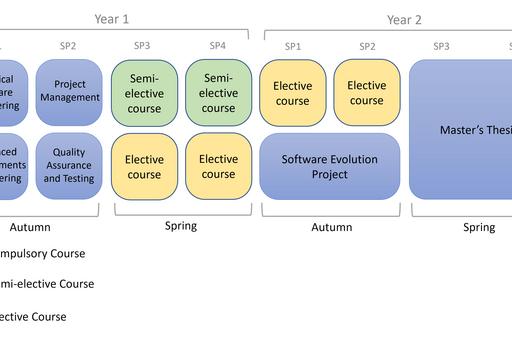Programme structure
Here you get an overview of the curriculum for the Master's programme in Software Engineering and Management. All courses except the master thesis work are half-time courses and give 7.5 or 15 credits depending on whether they run for one or two study periods.

Compulsory courses
The programme consists of six compulsory courses that provide a common ground of 75 credits shared by all students. The compulsory courses are:
Term 1
- Advanced Requirements Engineering (study period 1, 7.5 credits)
- Empirical Software Engineering (study period 1, 7.5 credits)
- Quality Assurance and Testing (study period 2, 7.5 credits)
- Project Management (study period 2, 7.5 credits)
Term 3
- Software Evolution Project (study period 1 and 2, 15 credits)
Term 4
- Master Thesis (30 credits)
Semi-elective courses
In Term 2 the students have to select at least 15 credits from a list of provided courses. The courses are organized in profiles of specializations. Each profile contains at least one course in study period 3 and one course in study period 4 (for selection in Term 2) . Students are not obliged to select both courses in a profile, but are recommended to do so to follow a learning sequence. The profile can then be further extended as a part of the final master thesis project.
Profiles offered directly by the programme:
Software Engineering for Data Intensive Systems
- Architectures for Scale-out Systems (study period 3, 7.5 credits)
- Advanced Software Engineering for AI/ML-enabled Systems (study period 4, 7.5 credits)
Human Factors in Software Engineering
- Agile Development Processes (study period 3, 7.5 credits)
- Behavioral Software Engineering (study period 4, 7.5 credits)
Profiles where the courses are offered by other programmes:
-
Software and user experience
- Software, strategy and leadership
- Software and communication
- Software and data science